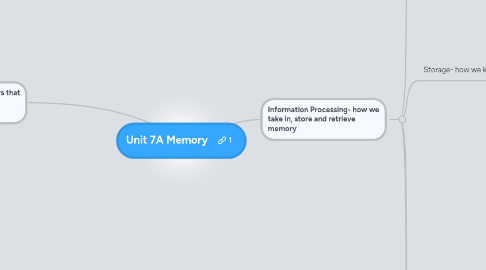
1. Memory Construction- factors that influence our memory construction
1.1. Misinformation Effect- I witness an event such as car crash~ if someone gives me a slightly misleading information, I misremember the event. For example, I over-exaggerate a car crash
1.2. Source Amnesia- I retain the memory of the event or story, but I forget where or who I acquired it from- ex. story I learned in 6th grade- thought I learned it from dad, but in fact from mom!
2. Information Processing- how we take in, store and retrieve memory
2.1. Encoding- how we get info into our brain
2.1.1. Parallel Processing- how our brain does many things at once~ we can multitask without or conscious attention
2.1.2. Automatic Processing- unconscious encoding by our brain of information about space (I remember where on the page I found this info), time (I can retrace my steps if I lost something), frequency (I met him four times todays!), and well-learned information (I register meaning of what a Korean sign says automatically)
2.1.3. Effortful Processing- we encode other info such as textbook reading with effort and attention~ produces durable and accessible memories
2.1.3.1. Spacing Effect- we retain info better when our rehearsal of info is distributed over time rather than cramming!!! Distributed studying = long term recall
2.1.3.2. Serial Position Effect- example: I am introduced to fellow team mates~ I am more likely to remember the best the names of the last and first person
2.1.3.3. Retention Curve- as I rehearse and repeat something I learned more, the time it takes for me to relearn it decreases ~ ALSO EBBINGHAUS
2.1.4. What We Encode
2.1.4.1. Levels of Processing
2.1.4.1.1. Visual Encoding- encode images and pictures of what I see
2.1.4.1.2. Acoustic Encoding- encoding of sounds (music, nature sounds, etc.) but especially the sound of words.
2.1.4.1.3. Semantic encoding- encoding of meaning, especially meaning of words. BEST~ produces better recognition than others
2.2. Storage- how we keep info inside our brain
2.2.1. How does the brain store memories?
2.2.1.1. Long-term Potentiation (LTP)- after rapid stimulation, there is an increase in a synapse's firing potential: sending neuron needs less prompting to release neurotransmitter
2.2.1.2. Explicit memory: needs conscious recall to remember how to do~ ex. when taking a quiz, I need to recall what I learned from last night's reading
2.2.1.2.1. Hippocampus: found in temporal lobe- helps process explicit memories in the brain for storage
2.2.1.3. Implicit memory- ex. riding a bike, playing an instrument, finding my way back home
2.2.1.3.1. Cerebellum: extends out from brainstem- responsible for forming and storing implicit memories~ with damaged cerebellum, I can't develop conditioned reflex such as not blinking when a puff of air is sent at my eyes
2.2.1.4. Retrograde Amnesia: I lose memory created prior to a traumatic event, but I can still create new memories
2.2.1.4.1. Anterograde Amnesia: I lose ability to make new memories after the event that caused amnesia, but I can still remember long-term memories from the past.
2.2.2. Storage Decay
2.2.2.1. Ebbinghaus' Forgetting Curve- course of forgetting is rapid~ I forgot quickly over next few days~ but after that it levels off with time
2.3. Retrieval- how we take the info or memory back out
2.3.1. Recall- ability to retrieve info no in the conscious awareness~ ex. need to remember something for fill-in-the-blank test
2.3.2. Recognition- measure of memory where I need to identify something I learned before~ ex. multiple-choice might be easier cause all I need to do is recognize term and defintiion
2.3.3. Relearning: time saved when relearning a material a second time~ ex. studying for SAT~ second time studying is easier than first
2.3.4. Retrieval Cues- when I encode a memory, I associate it with other bits of info about my surrounding such as mood and seating position
2.3.5. Deja Vu- feeling that I've been in a similar situation~ cues from current situation may subconsciously register an earlier experience
2.3.6. State Dependent Memory- ex. I was screaming at my mom when I learned something~ can't recall very well until the next time I'm screaming
2.3.6.1. Mood Congruent Memory- I recall experiences that are consistent with my current mood~ I'm angry that I did badly on a test so I recall an earlier experience like this
2.3.7. Retrieval Failure
2.3.7.1. Proactive interference: ex. I can't recall something because something that I learned earlier is interfering~ex. past phone number
2.3.7.1.1. Retroactive interference: I can't recall I learned earlier/in the past because of something I learned recently
2.3.7.2. Repression- basic defense mechanism where I banish all anxious and bad memories that I don't like from my consciousness
2.3.8. Self-reference Effect: I can recall something better if it is in some way related to my self
2.4. 3 Stage Processing Model of Memory- model that helps me think about different ways how memory is processed
2.4.1. Sensory memory- fleeting memory that is immediate/brief of sensory info
2.4.1.1. Iconic memory- brief sensory memory of an image; few tenths of a second, we can recall a scene in amazing detail
2.4.1.2. Echoic memory: ex. teacher asks what he said when you were day dreaming~ you say the teacher's last few words~ auditory echoes linger for 3 or 4 secs.

